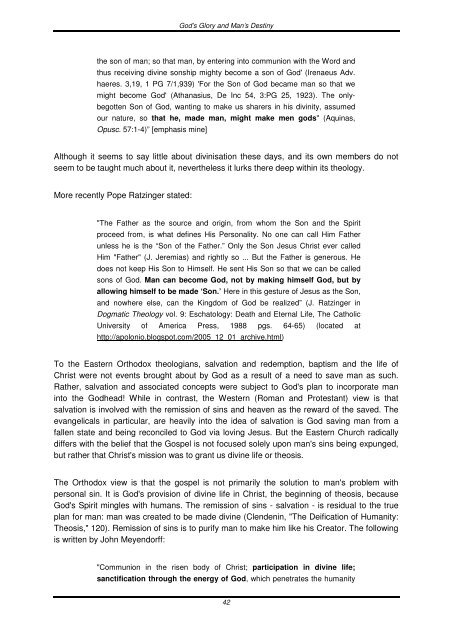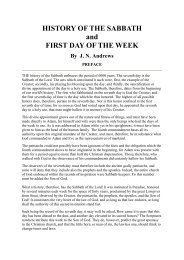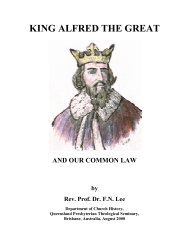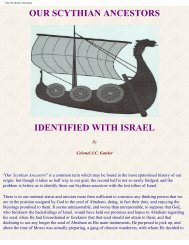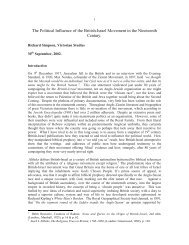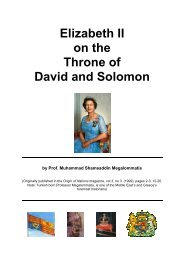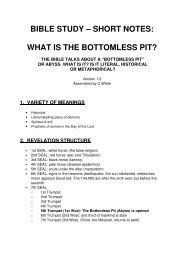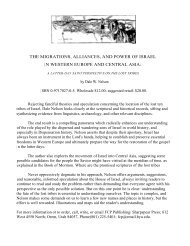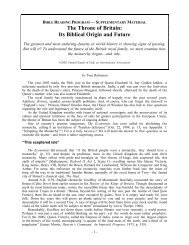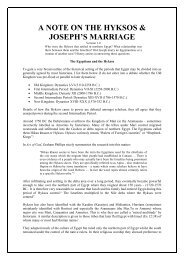Bible study By C M White - Origin of Nations
Bible study By C M White - Origin of Nations
Bible study By C M White - Origin of Nations
You also want an ePaper? Increase the reach of your titles
YUMPU automatically turns print PDFs into web optimized ePapers that Google loves.
God’s Glory and Man’s Destiny<br />
the son <strong>of</strong> man; so that man, by entering into communion with the Word and<br />
thus receiving divine sonship mighty become a son <strong>of</strong> God' (Irenaeus Adv.<br />
haeres. 3,19, 1 PG 7/1,939) 'For the Son <strong>of</strong> God became man so that we<br />
might become God' (Athanasius, De Inc 54, 3:PG 25, 1923). The onlybegotten<br />
Son <strong>of</strong> God, wanting to make us sharers in his divinity, assumed<br />
our nature, so that he, made man, might make men gods" (Aquinas,<br />
Opusc. 57:1-4)” [emphasis mine]<br />
Although it seems to say little about divinisation these days, and its own members do not<br />
seem to be taught much about it, nevertheless it lurks there deep within its theology.<br />
More recently Pope Ratzinger stated:<br />
"The Father as the source and origin, from whom the Son and the Spirit<br />
proceed from, is what defines His Personality. No one can call Him Father<br />
unless he is the “Son <strong>of</strong> the Father.” Only the Son Jesus Christ ever called<br />
Him "Father" (J. Jeremias) and rightly so ... But the Father is generous. He<br />
does not keep His Son to Himself. He sent His Son so that we can be called<br />
sons <strong>of</strong> God. Man can become God, not by making himself God, but by<br />
allowing himself to be made ‘Son.’ Here in this gesture <strong>of</strong> Jesus as the Son,<br />
and nowhere else, can the Kingdom <strong>of</strong> God be realized” (J. Ratzinger in<br />
Dogmatic Theology vol. 9: Eschatology: Death and Eternal Life, The Catholic<br />
University <strong>of</strong> America Press, 1988 pgs. 64-65) (located at<br />
http://apolonio.blogspot.com/2005_12_01_archive.html)<br />
To the Eastern Orthodox theologians, salvation and redemption, baptism and the life <strong>of</strong><br />
Christ were not events brought about by God as a result <strong>of</strong> a need to save man as such.<br />
Rather, salvation and associated concepts were subject to God's plan to incorporate man<br />
into the Godhead! While in contrast, the Western (Roman and Protestant) view is that<br />
salvation is involved with the remission <strong>of</strong> sins and heaven as the reward <strong>of</strong> the saved. The<br />
evangelicals in particular, are heavily into the idea <strong>of</strong> salvation is God saving man from a<br />
fallen state and being reconciled to God via loving Jesus. But the Eastern Church radically<br />
differs with the belief that the Gospel is not focused solely upon man's sins being expunged,<br />
but rather that Christ's mission was to grant us divine life or theosis.<br />
The Orthodox view is that the gospel is not primarily the solution to man's problem with<br />
personal sin. It is God's provision <strong>of</strong> divine life in Christ, the beginning <strong>of</strong> theosis, because<br />
God's Spirit mingles with humans. The remission <strong>of</strong> sins - salvation - is residual to the true<br />
plan for man: man was created to be made divine (Clendenin, "The Deification <strong>of</strong> Humanity:<br />
Theosis," 120). Remission <strong>of</strong> sins is to purify man to make him like his Creator. The following<br />
is written by John Meyendorff:<br />
"Communion in the risen body <strong>of</strong> Christ; participation in divine life;<br />
sanctification through the energy <strong>of</strong> God, which penetrates the humanity<br />
42


